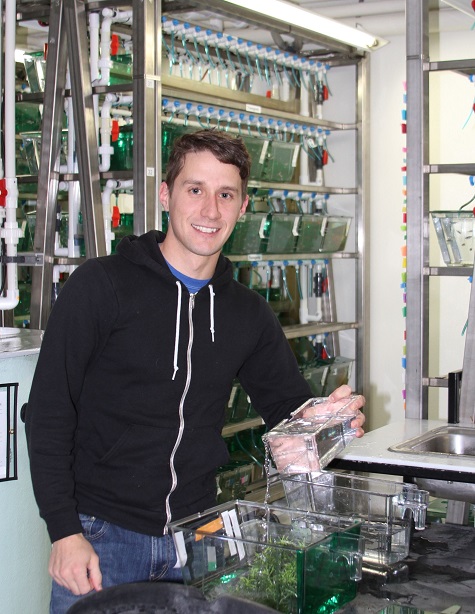In 2013, Cory won the best undergraduate research presentation at the PANWAT meeting in Seattle. The title of his PANWAT poster was “Mono-substituted isopropylated triaryl phosphate, a major component of flame retardant mixture Firemaster 550, is an AHR agonist that exhibits AHR-independent cardiac toxicity”.
In 2014, Cory won the best undergraduate poster presentation at the OSU EMT Research Day, and he received a Pfizer SOT Undergraduate Student Travel Award for the 2014 Annual Meeting of the Society of Toxicology (SOT) in Phoenix, AZ to present his recent findings.
Cory Gerlach hanging out with the zebrafish at the Sinnhuber Aquatic Research Laboratory (SARL)
Reflection of Experience by Cory Gerlach
My experience in the Tanguay lab has completely changed my career path.
Before I began my undergraduate research, I thought I would get a masters
in public policy or shift my focus from science to policy or law in some
graduate program. However, in the Tanguay lab I discovered my passion for
bench research, found that I was good at it, and learned that these basic
discoveries are crucial in order to affect policy and therefore improve
public health. Having Dr. Tanguay as a mentor has also helped me to keep
in mind the big picture of my research, and he has taught me that there is
always room for innovation and improvements to how we answer big research
questions.
My greatest moment in the lab was discovering that our original
hypothesis was incorrect. The entire process of uncovering the story
about how this specific component of the Firemaster 550 flame retardant
interacts with the aryl hydrocarbon receptor, and all of the work it took
to unravel this question was truly fulfilling. I loved the experience of
coming to Dr. Tanguay with confusing results, trying to figure out
what was happening, investigating the question from different angles,
never getting the results I predicted, pulling my hair out trying to
figure out what I did wrong, and then still putting together the story
that explained our findings. Also, writing the manuscript and presenting
our research at various venues has been an incredible experience as well.
After graduation Cory will be starting in the Biological Sciences in Public Health PhD program at Harvard University. There, he will continue to focus on toxicology and environmental health research, as well as gain experience with principles of epidemiology, “bench to bedside” research translation, and policy in order to improve public health.
Congratulations, Cory!
